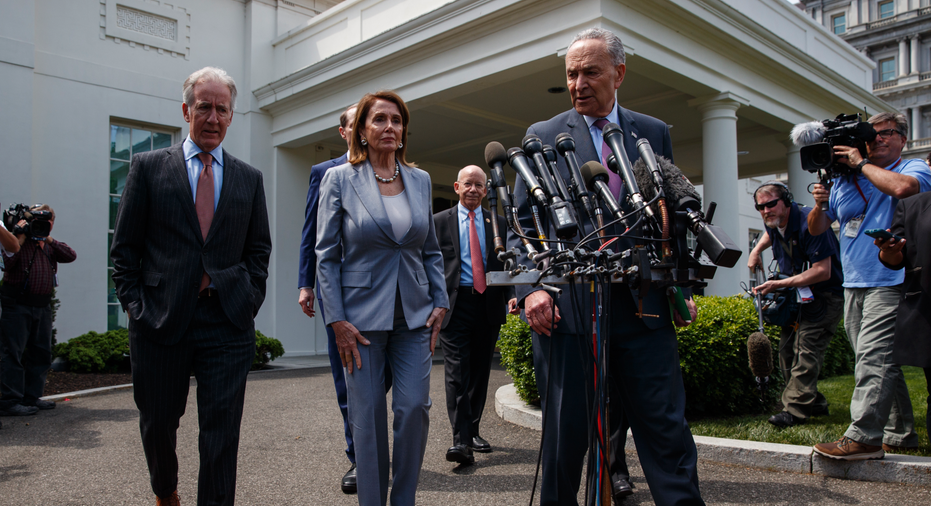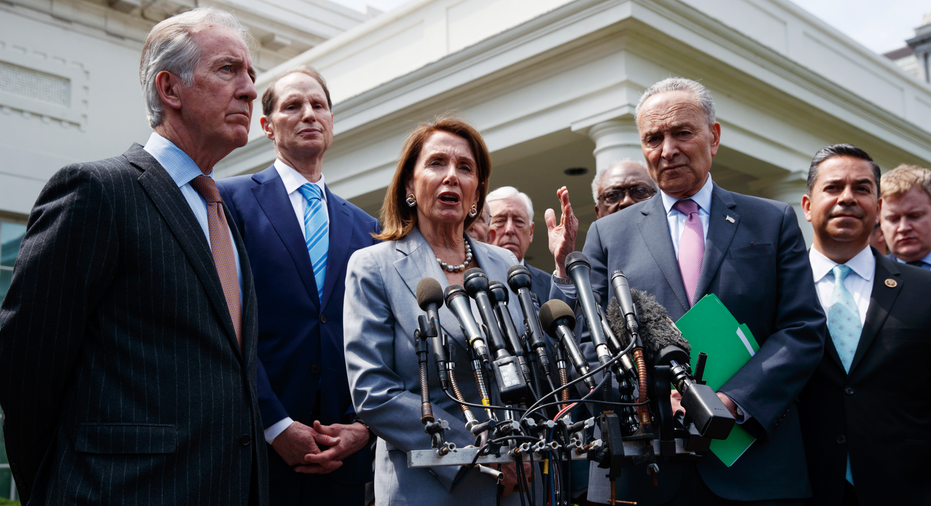Dems say Trump agrees on $2 trillion infrastructure goal
Speaker of the House Nancy Pelosi of Calif., and Senate Minority Leader Sen. Chuck Schumer of N.Y., walk over to speak with reporters after meeting with President Donald Trump about infrastructure, at the White House, Tuesday, April 30, 2019, in Washington. From left, House Ways and Mean Committee Chairman Rep. Richard Neal, D-Mass., Sen. Ron Wyden, D-Ore., Pelosi, Chairman of the House Transportation and Infrastructure Committee Rep. Peter DeFazio, D-Ore., and Schumer. (AP Photo/Evan Vucci)
WASHINGTON – In a rare moment of bipartisanship in polarized Washington, President Donald Trump and Democratic congressional leaders agreed Tuesday to work toward a $2 trillion infrastructure plan to rebuild roads and bridges, provide clean water and extend broadband coverage — but they put off the thorny matter of how to pay for it.
Both sides seemed determined to show a willingness to work with the other, even as tensions between the White House and congressional Democrats have only intensified with the release of special counsel Robert Mueller's redacted report on Russia meddling in the 2016 elections. Democrats have multiple investigations of the Trump administration underway, and Trump's White House is strongly resisting them.
But Senate Minority Leader Chuck Schumer said there was "good will in the meeting" — a marked departure from the last White House encounter between Trump, Schumer and House Speaker Nancy Pelosi, which ended with Trump walking out in a huff. At Tuesday's more muted meeting, by contrast, Trump at one point offered to share his Tic Tacs with Pelosi and she accepted, a Democratic aide recounted.
"We did come to one agreement: that the agreement would be big and bold," Pelosi said.
Schumer added that: "In previous meetings, the president has said, 'If these investigations continue, I can't work with you.'" But this time, Schumer said, "He didn't bring it up."
Schumer said the two sides agreed that infrastructure investments create jobs and make the United States more competitive economically with the rest of the world. Most importantly, Schumer said, "we agreed on a number."
"Originally, we had started a little lower. Even the president was eager to push it up to $2 trillion, and that is a very good thing," Schumer said.
White House press secretary Sarah Sanders, for her part, described the meeting as "excellent and productive."
Pelosi and congressional Democrats had asked for the meeting with Trump to discuss launching an ambitious building program that's a top priority for the party and has been a rare area of potential bipartisan accord with Republicans. Trump, too, has long promised a big infrastructure plan.
When Democratic lawmakers emerged, they said Trump agreed that infrastructure investments should go beyond roads and bridges and water systems to also include broadband.
Democrats also put the onus on Trump to come up with a plan for how to pay for the package, and said they would meet again in three weeks, when the president will present his ideas. They noted that a bill is unlikely to pass the Senate "if we don't have him on board."
An administration official said paying for infrastructure is something both sides have to work on together.
Trump, at one point, said he liked the number $2 trillion because it sounded better than $1.9 trillion, according to a Democrat who spoke about the meeting on condition of anonymity to discuss details of the private session.
The meeting tenor was decidedly more low-key than the last Trump session with the Democratic leaders. During one exchange, when Pelosi tried to get the president's attention as he and Schumer were having a side conversation, the speaker prodded, "If I may have your attention ... Mr. President ... Chuck ... Kids ..." That was according to the Democrat who described the meeting on condition of anonymity.
The nation's top business groups and labor unions support increasing the federal gasoline tax, currently 18.3 cents a gallon. It was last raised in 1993.
Schumer said the president didn't rule out tax increases to pay for infrastructure. Sanders' statement did not address the tax issue. Instead, it described the U.S., without elaborating, as "foolishly prioritizing the interests of other countries over our own."
"We have to invest in this country's future and bring our infrastructure to a level better than it has ever been before," Sanders added.
The meeting included a dozen congressional Democrats and numerous administration officials.
Before the meeting, senior aides seemed intent on setting low expectations. Asked whether Trump supports raising the gas tax, White House adviser Kellyanne Conway said "this president is the guy who lowers taxes."
And Mick Mulvaney, the president's acting chief of staff, said he hoped the conversations with Democrats would go well, "but if they don't, it would not surprise me."
More than one "infrastructure week" already has come and gone over the past two years with nothing to show for it. Still, advocates for an infrastructure package boost see a narrow window for action.
"I think a deal can be had if everybody is willing to put their battle axes away for a period," said former Republican Rep. Bill Shuster of Pennsylvania, who served as chairman of the House's transportation committee for six years.
Mulvaney indicated that won't be easy.
"To have an impeachment hearing on Monday, say, and then to think you're going to talk infrastructure on Tuesday, that's not how the world works, let alone Washington, D.C.," Mulvaney said at a conference he was attending in California.
Democrats insisted that they will proceed with their "oversight responsibilities" at the same time they're pushing for an infrastructure deal. "The two are not mutually exclusive, and we were glad he didn't make it that way," Schumer said.
A compromise could offer political benefits to both sides. Trump's re-election prospects are tied to a strong economy that would get another boost from new road and bridge projects. House Democrats have passed an array of bills that have gone nowhere in the GOP-controlled Senate.
Committees in both chambers of Congress have started to lay the groundwork for an infrastructure bill through hearings, with Democratic lawmakers hoping to have legislation ready for consideration by June or July.
___
Associated Press writers Darlene Superville, Catherine Lucey and Matthew Daly contributed to this report.
___
This story corrects reference to a $1.9 trillion plan, not $1.9 billion in paragraph 13.





















